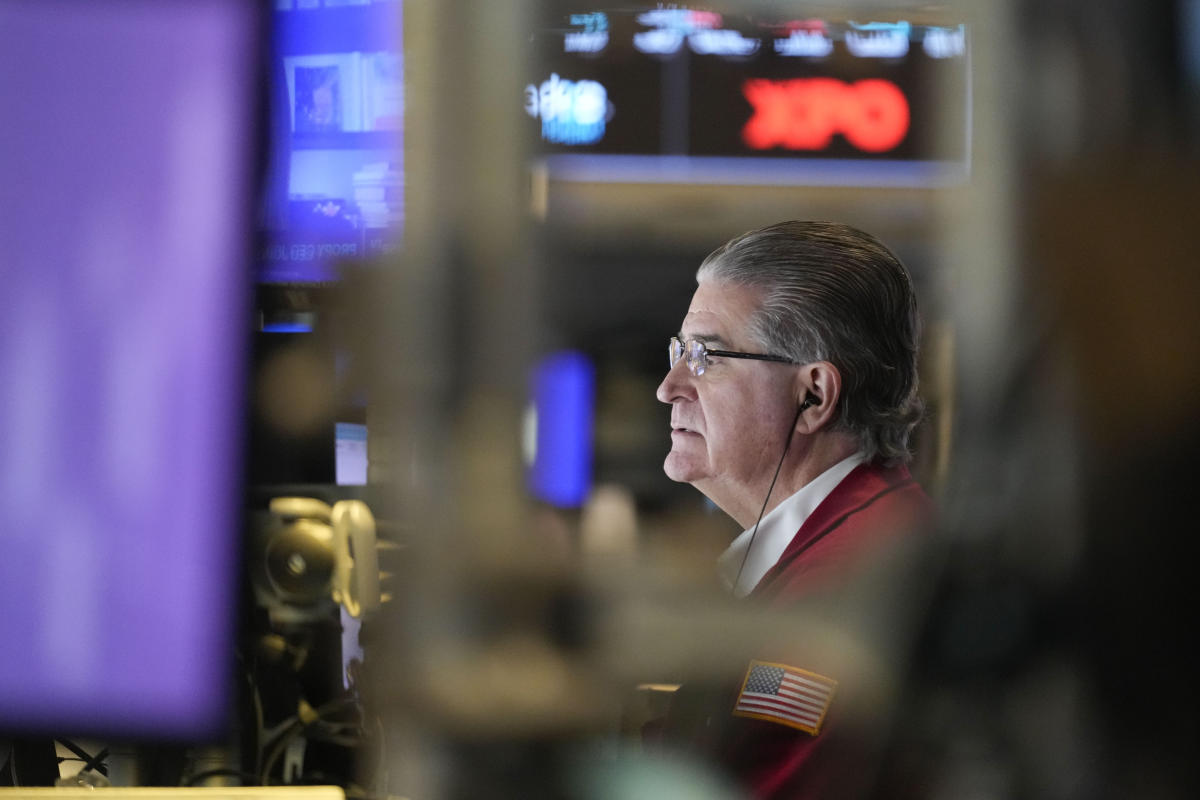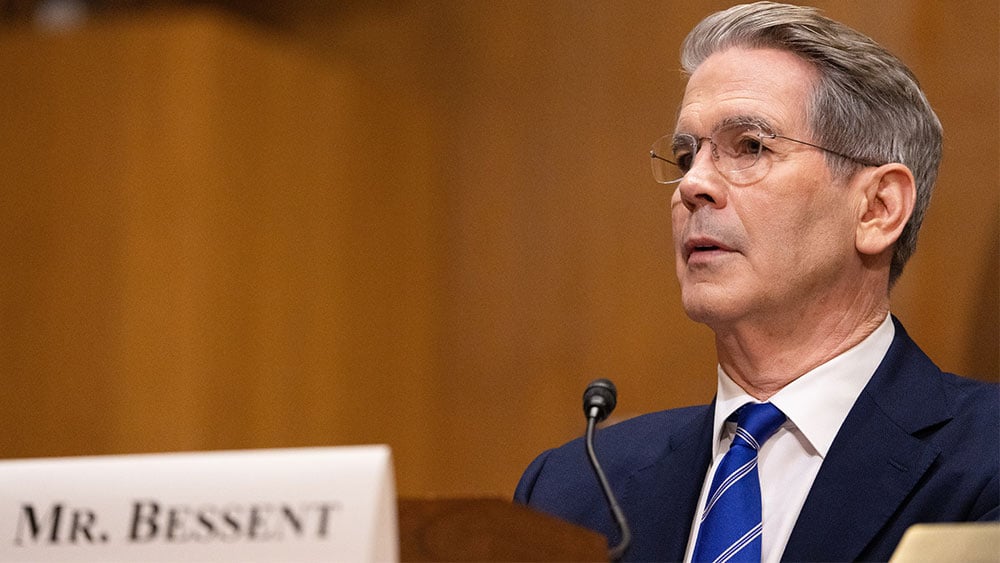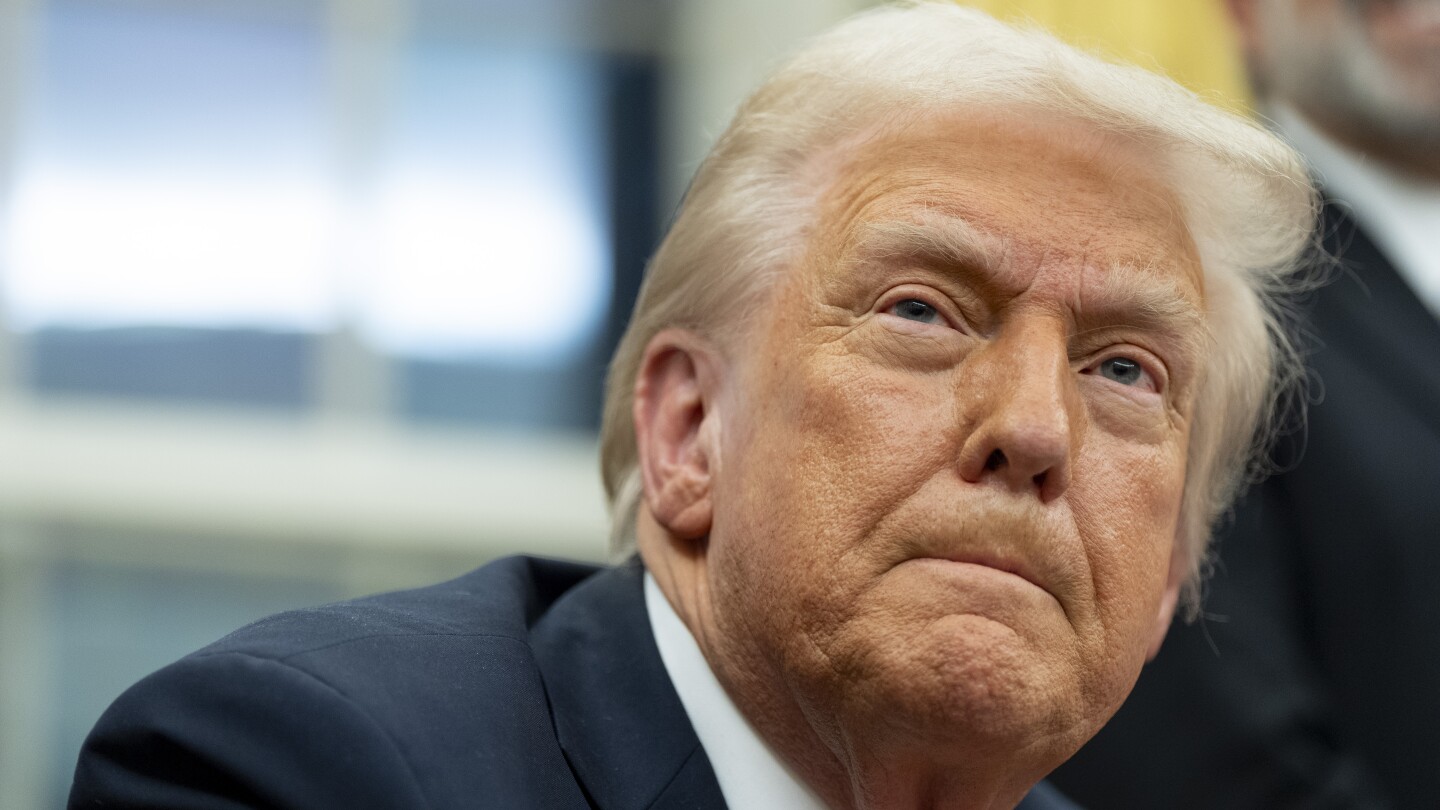Updated 1 min read
In This Article:
US stocks closed mixed on Tuesday as investors assessed more tariff policy shifts from President Donald Trump and looked ahead to upcoming inflation data.
Traders also digested the start of Federal Chair Jerome Powell’s two-day testimony in Congress. In his opening remarks, Powell told lawmakers the Fed is not in a rush to adjust interest rates and reiterated the central bank’s stance of not commenting on trade policy.
The Dow Jones Industrial Average (^DJI) edged around 0.3% higher, while the benchmark S&P 500 (^GSPC) closed just above the flatline. The tech-heavy Nasdaq Composite (^IXIC) pulled back about 0.4%.
The tone is cautious in the wait for Trump to reveal his plan for universal like-for-like tariffs, promised for announcement midweek. The president on Monday imposed 25% tariffs on all steel and aluminum imports from March 12, according to executive orders. That puts further pressure on top trading partners Canada and Mexico.
Meanwhile, the countdown is on for January’s Consumer Price Index reading on Wednesday and its wholesale counterpart on Thursday, as inflation stays persistent.
LIVE 21 updates
-
Super Micro says it will meet filing deadline
Yahoo Finance’s Laura Bratton reports:
Super Micro Computer (SMCI) stock seesawed Tuesday after market close as the company said it expects to submit delayed filings to the SEC by the Nasdaq’s Feb. 25 deadline to avoid delisting.
The company said it “continues to work diligently toward the filing” of its delayed annual and quarterly reports to the US Securities and Exchange Commission and “believes it will make such filings by February 25.”
Super Micro also reported preliminary quarterly earnings after the bell that missed Wall Street’s estimates. Super Micro said it expects to record a revenue of $5.6 billion to $5.7 billion for the December quarter, below the $5.95 billion expected by Wall Street analysts, according to Bloomberg consensus estimates.
The stock sank as much as 19% before reversing direction. Shares were up nearly 3% late Tuesday afternoon.
-
Stocks close mixed as traders look ahead to inflation data
US stocks closed mixed on Tuesday as investors digested the start of Federal Chair Jerome Powell’s two-day testimony in Congress and looked ahead to key inflation data, due Wednesday morning.
The Dow Jones Industrial Average (^DJI) edged around 0.3% higher while the benchmark S&P 500 (^GSPC) closed just above the flatline. The tech-heavy Nasdaq Composite (^IXIC) pulled back about 0.4%.
-
Intel stock jumps as Vance says Trump will ensure AI chips made in US
Intel (INTC) stock jumped 6.5% Tuesday after US Vice President JD Vance said during an address at the AI Summit in Paris that President Trump will “ensure” AI is built with domestically-produced semiconductors.
“To safeguard America’s advantage, the Trump administration will ensure that the most powerful AI systems are built in the U.S. with American designed and manufactured chips,” Vance said.
Intel is the only American leading edge computer chip foundry — which means it manufacturers chips for itself and other companies. US tech firms manufacture their most advanced chips with TSMC (TSM). Though Taiwan-based TSMC and Korea’s Samsung are expanding their footprint in the US, most of their manufacturing capacity is in their home countries.
Intel’s foundry strategy was aggressively pursued by CEO Pat Gelsinger as he looked to bring Intel back to the forefront of technological leadership after decades of missteps. But Gelsinger was ousted by Intel’s board in December as investors grew impatient with the money-losing approach. The chipmaker is in the process of searching for a new chief executive, and it’s unclear whether its next leader will pursue foundry with the same rigor as Gelsinger.
Even with Tuesday’s gain, Intel shares are down more than 50% from last year.
-
January CPI report expected to show sticky inflation
January’s Consumer Price Index (CPI) will serve as the latest test of whether inflation pressures eased further to kick off the year as investors debate if and when the Federal Reserve will cut interest rates in 2025.
The report, set for release at 8:30 a.m. ET on Wednesday, is expected to show headline inflation of 2.9%, matching the annual gain seen in December. Consumer prices are expected to have risen 0.3% over the prior month, a slight deceleration from the 0.4% monthly increase seen in December.
On a “core” basis, which strips out the more volatile costs of food and gas, prices in January are expected to have climbed 3.1% over last year, the lowest level since April 2021. This would also mark a downtick from the 3.2% seen in December, which was the first time since July that year-over-year core CPI saw a deceleration in price growth.
Economists expect monthly core price increases to come in at 0.3%, slightly higher than the prior month’s reading of 0.2%, according to Bloomberg data.
-
Super Micro stock falls ahead of earnings
Super Micro Computer (SMCI) stock fell around 7% in afternoon trading Tuesday, ending a five-day rally that saw shares gain nearly 60%.
Yahoo Finance’s Laura Bratton has the details:
Shares of the Super Micro — a rival to Dell (DELL) that makes computer servers using Nvidia’s (NVDA) latest Blackwell AI chips — soared 18% Monday to nearly $43, their highest level since last October.
The stock has been on an upswing ahead of its scheduled business update after the bell on Feb. 11, which investors hope will shed light on how the company is working to comply with the Nasdaq to avoid delisting after a turbulent year.
Despite the gain, Super Micro Computer shares remain far below their all-time high of roughly $123 last March ahead of the company’s milestone addition to the S&P 500. After that peak — which followed the stock’s stellar performance in 2022 and 2023 — SMCI shares began to waver as the server maker struggled to meet analysts’ and investors’ high expectations and grappled with the fallout from a scathing report published by short-selling firm Hindenburg Research.
Super Micro reports its fiscal second quarter earnings for the December period after the bell.
-
Tech Check: Tesla drags down Nasdaq
The tech-heavy Nasdaq Composite (^IXIC) lagged the major indexes on Tuesday, dragged down by megacap names like Tesla as AI spending fears continue to weigh on the Magnificent Seven.
Tesla (TSLA) fell over 5% after Chinese automaker BYD (1211.HK) inked a deal with DeepSeek, the China-based generative AI company, to co-develop new autonomous technology.
The development comes as Tesla CEO Elon Musk captured Wall Street’s attention after he offered to buy Microsoft’s OpenAI. CEO Sam Altman shot down the unsolicited offer of $97.4 billion, a significant undershoot of its valuation.
Oppenheimer analyst Colin Rusch weighed in on the news in a note to clients:
Elsewhere in tech, Meta (META) began to lay off workers as part of CEO Mark Zuckerberg’s pledge to cut thousands of jobs in a pivot to finding AI talent.
-
Gold surges as tariff threats drive up demand
Gold took a breather on Tuesday after a massive 10% run since the start of the year. But Wall Street sees more room to run on the heels of recent tariff announcements.
Yahoo Finance’s Ines Ferré has the details:
On Tuesday, gold futures (GC=F) pulled back after jumping to an all-time high past $2,960 over the past 24 hours in reaction to President Donald Trump’s tariff plan against steel and aluminum imports.
“We continue to see gold as an effective portfolio hedge and diversifier,” Solita Marcelli, chief investment officer for the Americas at UBS Global Wealth Management, wrote in a note Tuesday.
Marcelli added: “We recently raised our gold forecast to USD 3,000/oz for 2025 as we believe the metal will continue to be supported amid fragile risk sentiment and strong demand.”
On Monday the president signed an executive order raising duties on steel and aluminum imports to 25% starting on March 12. The European Union has vowed to react with its own countermeasures, fueling concerns of a trade war.
Meanwhile, this week, Trump is expected to unveil a retaliatory tariff plan against countries that impose levies on US goods.
“In addition to tariff uncertainty and geopolitical tensions, further rate reductions from the Federal Reserve later this year should also boost the investment case for gold,” UBS’s Marcelli said.
-
Powell emphasizes need for Fed independence
Powell reiterated on Tuesday the importance of Fed independence.
“We’ll make better policy and keep inflation lower if we just focus on doing our job and stay out of politics, stay out of elections, and don’t try to favor or hurt any political party,” Powell said, emphasizing the need for central bank leaders to just “focus on the data.”
“If we start putting up political filters … we’ll be less effective at our already difficult job,” he said, although he noted that it’s still important for the central bank to remain accountable and be transparent in its decisions.
-
Powell: Housing prices likely to remain elevated
Powell said housing prices are likely to remain elevated, even if mortgage rates decline.
“Housing markets around the country are still suffering from the after-effects of the pandemic,” Powell said on Tuesday. “Once that’s all the way through and short-term rates are down to normal, whatever the new normal level is, I think housing costs are still going to be high.”
Powell added it will likely continue to be expensive to build homes in many parts of the country, noting, “There’s a short-term problem, which will go away in the coming years, but there’s a longer-term problem with housing availability.”
“And that’s that’s going to be something that is not within our authority or power to affect.”
The central bank leader also said “it’s not clear” that lower rates would lead to lower housing inflation since an unlocking of low rates would boost demand.
-
Powell: There will be a regulatory framework for stablecoins
Powell said definitively on Tuesday that “there will be a regulatory framework” for stablecoins and that the central bank “supports” efforts to create one.
“Stablecoins may have a big future with consumers and businesses,” Powell said. “We can’t know that now. But it is important for the development of stablecoins and a safe and sound manner that protects consumers and savers.”
A stablecoin is defined as any cryptocurrency designed to have a relatively stable price, typically pegged to a particular commodity or currency such as the US dollar.
-
Powell: Not Fed’s job to comment on trade policy
Powell said he “would stand by” previous comments that countries that have remained open to trade and did not erect barriers like tariffs have grown faster and had higher incomes.
“I think the standard case for free trade and all that logically still makes sense,” the Fed chair told lawmakers on Tuesday. “It didn’t work that well when we have one very large country that doesn’t really play by the rules.”
“And in any case, it’s not the Fed’s job to make or comment on tariff policy,” he continued. “That’s for elected people. And it’s not for us to comment. Ours to try to react to it.”
Powell’s remarks come after President Trump announced global 25% tariffs on steel and aluminum imports, which will take effect on March 12. Earlier 25% tariffs on Mexico and Canada are set to come next month, while 10% duties on China have already been implemented.
The central bank leader later added it ultimately remains to be seen what tariff policies will be implemented and when: “I just think it would be unwise to speculate when we really don’t know. I mean, we see proposals, but it’s so hard to say what’s going to happen.”
-
Powell on if US has achieved ‘soft landing’: ‘Not for me to say’
Powell said he couldn’t comment on whether the US economy has achieved a “soft landing,” telling lawmakers that it was “not for me to say.”
The soft landing, defined as a scenario where economic growth slows but not to the point of a recession, has been questioned in recent weeks as some economists believe the US could face another inflation resurgence under President Trump.
Powell added, though, that the US is not in a “hard landing,” where a restrictive monetary environment forces the economy into a recession.
-
Powell: Playbook has been revised following SVB collapse
Fed Chair Jerome Powell said during the start of his two-day testimony on Tuesday that the playbook has been revised “in a lot of ways” following the stunning collapse of Silicon Valley Bank (SVB) in 2023.
“The supervisors didn’t follow through aggressively enough on things that they’d said,” Powell said. “If they’d done that, that could have been enough to stop it. But a lot of it was just not focusing enough directly on what was a very large amount of interest-rate risk, a large portfolio of long-term securities matched up with an unstable funding base.”
On March 9, 2023, depositors scrambled to pull out more than the $40 billion from SVB as panic spread across Twitter, as well as on other social media platforms like Slack and WhatsApp. The rush came after the bank revealed a $1.8 billion loss within its bond portfolio and plans to raise more than $2 billion in new capital.
“Somehow, we don’t expect bank runs outside of a crisis in this country,” Powell said in his testimony. “And that’s what that was. It was a bank run. And bank runs are incredibly damaging. I think everyone learned a lot from that and is determined to do better.”
-

Powell says, ‘We do not need to be in a hurry’ to cut rates
Fed Chair Jay Powell is set to begin taking questions from lawmakers in minutes, and in prepared remarks released ahead of his testimony, he reiterated his view that the central bank does not need to be in a hurry to cut interest rates.
“With our policy stance now significantly less restrictive than it had been and the economy remaining strong, we do not need to be in a hurry to adjust our policy stance,” Powell said.
Referring to inflation, Powell said pricing pressures remain “somewhat elevated relative to our 2% longer-run [inflation] goal.”
On the broader economy, Powell said it is expanding at a “solid pace.”
-
Coca-Cola on tariff impact, inflation
Coca-Cola (KO) posted another strong quarter as the beverage giant’s management team discussed the potential impact of Trump’s tariff policy and recent pricing pressures.
Yahoo Finance’s Brooke DiPalma has the details:
“Commodities will be in the low-singles range overall, [with] some pressures on the agricultural — particularly juice and coffee — that are a big part of our base,” Coca-Cola CFO John Murphy said on the earnings call. “We have the usual set of levers that will deploy to cover those.”
CEO James Quincey added that President Trump’s latest aluminum tariffs will predominantly impact the US market.
“If one package suffers an increase in input costs, we continue to have other packaging offerings that will allow us to compete in the affordability space,” Quincey said.
He added that if aluminum gets more expensive, the company will put more emphasis on plastic bottles. He called it a “manageable problem.”
-
Stocks open lower with tariffs top of mind
US stocks opened lower on Tuesday with tariff uncertainty top of mind for investors as traders also looked ahead to testimony from Federal Chair Jerome Powell on deck later this morning.
Shortly after the opening bell, Dow Jones Industrial Average (^DJI) moved around 0.3% lower, while the benchmark S&P 500 (^GSPC) also dropped roughly 0.3%. The tech-heavy Nasdaq Composite (^IXIC) pulled back around 0.5% after a winning day on Wall Street.
-
Oil adds to gains amid signs of sanctions hit to Russia supply
Oil futures rose 1.4% on Tuesday, on track for a third day of gains, as investors assessed signs that US sanctions on Russian crude are putting a dent in the major producer’s output.
Brent crude futures (BZ=F), the international benchmark, climbed to just below $77 a barrel after closing 1.6% higher on Monday. US benchmark West Texas Intermediate futures (CL=F) moved up to $73.35 per barrel.
Russia’s oil production fell in January to further below its OPEC+ quota, Bloomberg reported. Meanwhile, its crude supplies are being offered to Chinese buyers at deeper discount as the US sanctions bed in, it said.
The signs of faltering Russian supply appeared to eclipse market worries about the impact on the global economy of Trump’s tariff overhaul, which promise to crimp demand.
-
The start of Trump 2.0 is not quite what Wall Street expected
President Trump’s unexpected policy moves are unsettling expectations at big financial institutions, David Hollerith reports:
-
Good morning. Here’s what’s happening today.
-
Hang Seng closes 1% lower as Asia stocks falter
Stock indexes in Asia fell on Tuesday as investors warily assessed the impact of Trump’s tariffs on steel and aluminum, while Chinese carmaker shares slid.
Hong Kong’s Hang Seng (^HSI) dropped over 1%, while the CSI 300 (000300.SS) in Shanghai Shenzen fell 0.5%, both gauges reversing course after rising for several sessions.
The Sensex (^BSESN) in Bombay tumbled 1.3% amid concerns over the impact of the new 25% tariff on the primary aluminum producer’s exports to the US.
On the corporate front, shares of Chinese automakers Xpeng (9868.HK, XPEV) and Geely Auto (0175.HK, GELYF, GELYY) tumbled in Hong Kong, down 9% and 10% respectively.
The moves came after China’s BYD (1211.HK, BYDDY) launched free smart-driving features across most of its lineup, intensifying a regional EV price war and briefly lifting its share price to a record high. At the same time, fresh data showed Chinese car sales posted their biggest drop in almost a year in January.

















